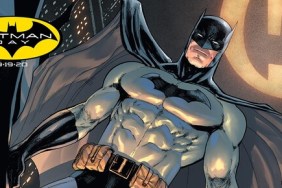And then Barbara wakes up.
Are you feeling betrayed right now? Don’t. “Over the Edge” isn’t a throwaway filler episode with a gimmicky twist ending. It’s one of the few episodes of “Batman: The Animated Series” that actually matters to the heroes of the show.
Batman is a static figure, incapable of change or even total failure. Batman is a representational figure, stalwart and unmoving, who will always get out of a jam unscathed. The reason episodes like “Heart of Ice” remain so unforgettable to fans of “Batman: The Animated Series” is because genuine tragedy – beyond the death of Batman’s parents – can only happen in the lives of his villains. Genuine drama comes from genuine consequence, but if Batman and to a lesser extent his supporting cast cannot alter their behavior without the fans crying foul (like everyone who complained about Batman retiring a few years prior to Christopher Nolan’s The Dark Knight Rises), there’s only so much that can be done with the character, and an episode with the events that transpire in “Over the Edge” would be impossible.
So the creators of “Batman: The Animated Series” – particularly Paul Dini, who conceived of and wrote the episode – crafted an installment in which we could at last see those consequences play out, and play out in the most horrifying way imaginable. Beautifully animated, wonderfully dramatic or otherwise, this was still an episode of children’s television that featured the death of four beloved characters, including a young girl who falls off a building onto her father’s moving car, on camera. This was an episode that found Jim Gordon falling into ruin, compromising his ideals to become the same kind vengeance-crazed tragic figure Batman normally stops in any given episode. This was an episode that shows Batman driven to actual murder, electrocuting Bane on purpose using the Bat Signal that previously symbolized hope for justice within Gotham City.
So what if it’s all a dream? Of course it was. Barbara was fighting The Scarecrow, a villain defined by his use of fear toxins to make people confront their worst nightmares. Batman recalls events that he wasn’t there to witness. Paul Dini cleverly disguised the reveal using a flashback within a dream sequence – almost never done, dramatically speaking – and killing off the dreamer in the first act. It’s a twist ending, certainly, but by the time the big reveal comes, audiences were probably hoping the downfall of Batman and his supporting cast couldn’t possibly be real. How the hell would Warner Bros. have let them get away with that if it all really happened?
But ignore for a moment the clever structuring in “Over the Edge.” The episode transcends a typical dream storyline by using that dream to inspire the very kind of dramatic consequence that “Batman: The Animated Series” otherwise never allowed itself. Batgirl’s dream was the embodiment of her worst fears, and that fear was not of her own death: it was of the aftermath, the possibility that dying without telling her father the truth about her secret life would destroy everyone she cares about. As depicted in “Over the Edge,” it seems like a plausible concern. After she wakes up, she tells Alfred, “It seemed so real.” He responds “To you it was,” and he’s right. It may not have really happened, but this is the anxiety Batgirl has lived with since taking the job.
The events of “Over the Edge” embody Batgirl’s insecurity and paranoia, issues that she has clearly been living with throughout the whole series. It highlights a fundamental tragedy in her character, and Batman’s, in that they think their greatest ally, supporter and friend – Commissioner Gordon – cannot be trusted with their secrets. So, inspired by this nightmare, Barbara finally decides to come out to her father. Batman pauses for a moment, and then agrees to allow it. And she does come out. Or at least, she tries, because before she can get the words out Commissioner Gordon stops her.
“Barbara, please. Sweetheart, you’re capable of making your own decisions. You don’t need me to approve or even acknowledge them. And in this case, I can’t. All you need to know is that I love you. All of you. And that is all I have to say on the matter.” (Emphasis mine.)
This was a major step for Batgirl’s character, her relationship with her father, and the audience’s relationship with Commissioner Gordon as well. For years people have wondered why Gordon, if he’s such a great detective, couldn’t figure out who Batman was, and why he was so oblivious to his own daughter’s involvement in Batman’s vigilantism. But neither Batman, Batgirl nor most of the audience were giving the Gordon enough credit. He knew all along, or at least he knew long enough to neutralize any sense of betrayal he might have felt by the discovery, and he could handle it. He’s a good man, a good cop, and a pretty good father, provided you allow that in the world of “Batman: The Animated Series” being a superhero is a noble endeavor, and not a career that a reasonable father would protect his child from at all costs.
“Over the Edge” aired in the last season of “Batman: The Animated Series,” after it had changed its name to “The Adventures of Batman & Robin.” There was no time to play up this change in the series’ paradigm, if indeed they ever intended to bring it up again. That’s okay. Gordon told them they never needed to. The important thing isn’t that Gordon already knew, the important thing was that the principle heroic cast of “Batman: The Animated Series” – defined by their unchanging natures – agreed to change if it was necessary, and to finally deal with the consequences, as a result of this episode. That there were no negative consequences doesn’t negate the very real possibility that there very likely could have been, and the dramatic possibilities of those repercussions – spectacularly realized in “Over the Edge” – were no less incredible for not “really” happening. We at least got to see them, and we got to see the positive outcome as well. That was real.
Most importantly, we got the Best Episode Ever of “Batman: The Animated Series,” in the process.









